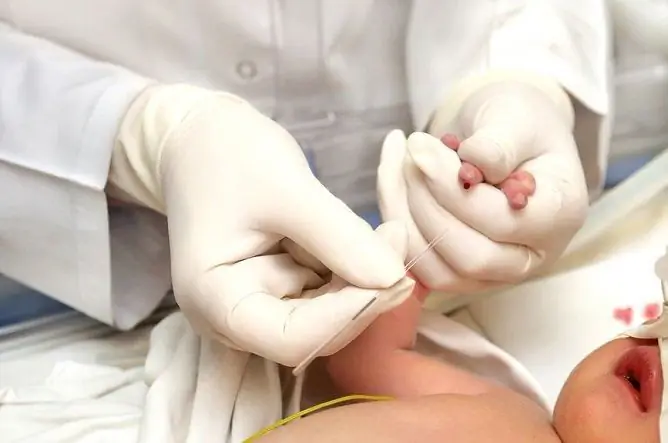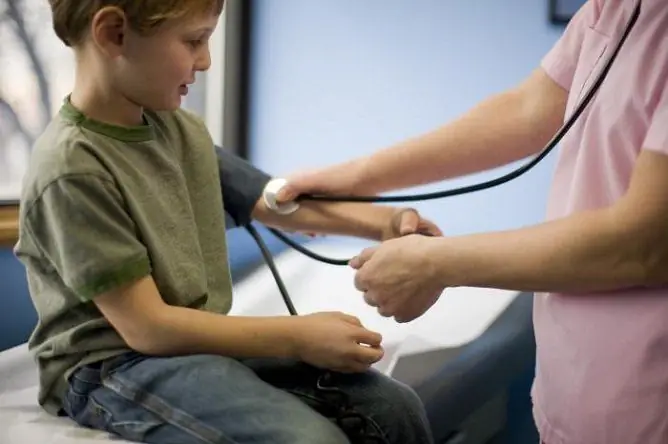- Author Rachel Wainwright wainwright@abchealthonline.com.
- Public 2023-12-15 07:39.
- Last modified 2025-11-02 20:14.
Teething cough in children
The content of the article:
- How does a teething cough manifest?
- What to do if a child has a teething cough
- Video
Teething cough in children is a physiological phenomenon, but when it occurs, you need to make sure that this symptom has not developed against the background of any disease.
Roughly teething and the accompanying cough is observed in a child aged 6 to 9 months (2 front lower incisors), at 7-10 months (2 front upper incisors), by 12 months (lateral incisors), by about 1.5 years (molars, canines). By the age of 2-3, a toddler usually has about 20 upper and lower teeth. In girls, teeth usually begin to appear a little earlier than in boys.

Teeth-related cough in babies does not require treatment
Many parents are worried about whether children can have a cough during teething, why this happens and how they can help the child during this period. Teething cough is not common in all children. The main reason for its development in this case is hypersalivation, i.e., increased production of saliva. Saliva often enters the respiratory tract, causing the development of the cough reflex. A severe cough in infants during teething can be caused by crying for a long time due to discomfort in the gums. Crying leads to drying out of the mucous membranes of the throat, their irritation, against which a dry cough develops. Both dry and wet cough caused by the appearance of teeth in a child usually disappears after 2-3 days, it does not need to be treated.
How does a teething cough manifest?
During teething in babies, cough is preceded by profuse salivation, pronounced swelling of the gums and their hyperemia, discharge from the nasal cavity, clenching of the jaws, lack of appetite, frequent awakenings at night, sudden mood swings, sometimes a slight increase in body temperature (more often the temperature remains within the norms). A teething baby may bite the nipples while feeding, and may have constipation or diarrhea. These manifestations are noted for several days before the onset of cough.
During a baby's teething, the cough is usually moist and a lot of mucus is produced. Less often, an unproductive cough, as a rule, is noted when the first teeth appear. This cough does not last longer than four days, it subsides after the appearance of the next tooth.
Excessive salivation in a child is accompanied by skin irritation on the lips and cheeks.
The tension of the upper gums often causes a child to develop a runny nose, but the mucus is completely transparent. Discharge, flowing down the back of the pharynx, causes irritation and a cough reflex. If such discharge becomes yellowish or greenish in color, this indicates the addition of inflammation and is the reason for contacting a doctor.
A severe cough as the teeth grow can cause nausea and vomiting. However, such symptoms are also observed in a number of pathological conditions, including infectious diseases. Therefore, in the case of the development of such signs, you should consult a pediatrician to exclude pathology.
If, during teething, a child develops a respiratory disease, in addition to coughing, he may experience wheezing in the chest, an increase in body temperature. With a cold, coughing can be both productive and unproductive. Irritation of the skin around the lips and on the chin of the child, as is the case with hypersalivation, is absent.
In addition, you should immediately seek medical help if the cough is accompanied by attacks of suffocation, complete nasal congestion, high fever, and profuse skin rashes. The doctor will conduct an examination and, if necessary, prescribe treatment for the child.
What to do if a child has a teething cough
A cough caused by excessive salivation from teething goes away on its own. The use of any antitussive drugs is not required. It is necessary to regularly ventilate and humidify the air in the room where the baby is, take walks with him in the fresh air, and provide an abundant drinking regime.

If, in addition to coughing, a child with cutting teeth has a fever, a skin rash, nasal congestion, you should consult a doctor
You can resort to methods to ease the baby's discomfort (reduce cough and runny nose, eliminate irritation of the skin and mucous membranes). For these purposes, it is recommended to bury the child's nasal cavity with a saline solution such as Aqua Maris, which helps prevent the development of cough at night and relieve him of a cold. You can remove mucus from the child's nasal cavity using an aspirator or a pear, use a teether, massage the gums in the place of growth of the next tooth. You can distract your child from the unpleasant sensations of teething by offering him a favorite game or other entertainment.
With severe pain during teething, causing long crying and fever, a doctor may prescribe analgesic drugs in the form of an ointment, gel, syrup, rectal suppositories. Before applying the analgesic drug to the gums, the child's oral cavity must be cleaned of food debris, excess saliva, and the mother or another adult should thoroughly wash and dry their hands, and there should be no long nails. A small amount of the product is squeezed onto the index finger and distributed on both sides of the erupting tooth, while gently massaging the gum.
It is necessary to monitor the general condition of the child, including measuring his body temperature, since against the background of reduced immunity, certain pathologies may develop that may need to be differentiated from ordinary cough with the growth of teeth.
Video
We offer for viewing a video on the topic of the article.

Anna Aksenova Medical journalist About the author
Education: 2004-2007 "First Kiev Medical College" specialty "Laboratory Diagnostics".
Found a mistake in the text? Select it and press Ctrl + Enter.






